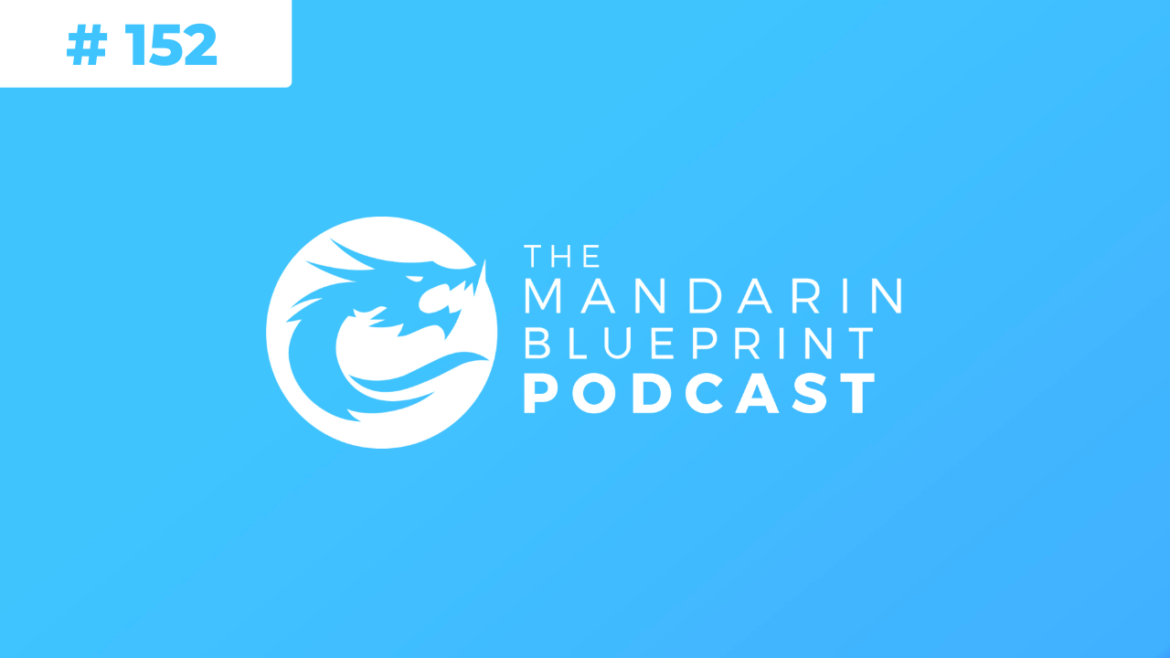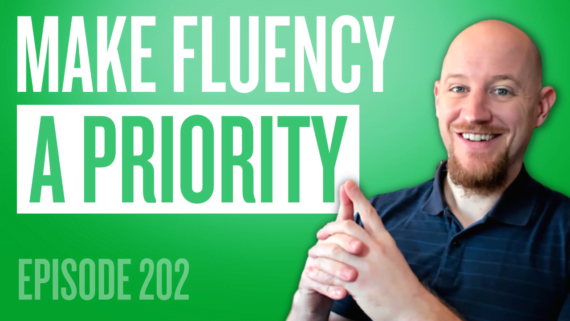欢迎光临! Welcome!
You can now subscribe to the podcast by the links below, or you can subscribe by copying the following URL into your favorite podcast APP.
The Mandarin Blueprint Podcast focuses primarily on The Blueprint online curriculum. Creators Luke Neale & Phil Crimmins answer questions and comments, discuss topics related to China and Mandarin learning, and have special guests.
Want to learn how to speak fluent Chinese fast? Join our free Webinar right here.
欢迎光临! Welcome!
You can now subscribe to the podcast on iTunes, Stitcher, Spotify, or you can subscribe by copying the following URL into your favorite podcast APP:
https://www.mandarinblueprint.com/feed/podcast/
The Mandarin Blueprint Podcast focuses primarily on The Mandarin Blueprint Method online curriculum. Creators Luke Neale & Phil Crimmins answer questions and comments, discuss topics related to China and Mandarin learning, and have special guests.
0:00 Affiliate Link & Reviews
Leave us a Google Business Review 🙂
5:56 Comments & Emails
Michael Rotchford by Email
(This email is in reply to a conversation we had with Christine and Rebecca about begin study buddies. Check out that conversation here.)
Hey guys,
After completing the intermediate portion of MB I have to admit I am very excited for your next section.
I believe that it took me around 18 months to get here.
I guess it was about halfway through the intermediate course that I started to get this craving for learning so much more vocabulary. It was driving me nuts! The feeling that I was just “this close” to having a major breakthrough. I never cut out any sentences though.
My feeling for me was that I needed to know the vocabulary and the sentences provided a solid method to hone my understanding of the words as well as a constant reinforcement of vocabulary I had previously learnd. Moving my understanding of characters to knowing words.
Sure, I had wanted to dish the sentences many times so I could just learn new characters but for me understanding words was more important than having a lot more characters under my belt.
That being said, I have added more words to my vocabulary than have been in the course so far that I found interesting as well as my own sentences to go with them.
I guess this all goes to show you how great your method is. You can take many different approaches to satisfy the individual wants and needs of each person. It is not a 1 size fits all kind of thing.
For me, at this stage of things I could easily learn 50 new characters in an hour. I figure it took longer to add a character to anki than to come up with my movie but I’m not in a race and know I am getting closer to that level of fluency that I am seeking.
I do think the metaphor shouldn’t be climbing a mountain. Maybe that was at the beginning of your course but rather I feel like I am walking down that mountain and it’s starting to snow and you guys have just handed me a pair of ski’s. Through it all this has been a great trip and has been fun and exciting at every turn.Thanks, guys I still am having a blast!
Mike Rotchford
14:37
Terry Lee by Email
Hi,
The reason I want to learn Manderin is because My mother in-law and two sister in-laws are Chinese living in Benxi near Shenyang. I was fortunate to be able to visit them with my wife in the early fall of 2018 for 6 weeks. I had a very good time in spite of having no ability to communicate. Basically I Nodded, ate and smiled a lot… So upon returning to Florida I decided to see if I could learn a little Manderin in preparation for a future visit.
My wife who is Chinese suggested that I find a course as she could tell me if I was doing it wrong, but would not be able to really tell me how to do it right. After casting around some I finally settled on the Yang Yang Chinese course. Earlier in my life (I am 75) I lived in France for 25 years. Before going I decided to try and learn a little French. At the time there was no internet, so I had a French lesson book, with it and eventually books from the library, I was able to learn how to read, actually quite well. Before going I remember reading Solzhenitsyn’s “Pavilion Cancereux” A French translation from Russian. Of course I could not speak well, had a horrible accent and could understand almost nothing folks said. But after living a while it started to click.
With Yang Yang Chinese I did her beginner course and about 2/3 of the Intermediate conversational course. I coupled it with complete Anki cards in both directions with audio, pinyin and character text. In spite of this, although I did learn a lot of words I had a very difficult time remembering tones and really had a lot of trouble recognizing speech, phrases I should have known. I understand that I am not a spring chicken but somehow I felt I had hit a major blockage. So after two years of daily effort and with my wife telling me that my pronunciation is awful I decided to look around to see if there wasn’t an approach that suited me better.
I have heard of memory palaces before and even read an article by a guy named Mullen that talked about using such a technique to learn Mandarin. However it was more theory and not a guide that was complete enough to be of use to me. Eventually I stumbled on your course.
I was interested in starting over on Pronunciation given my wife’s opinion on how I was doing. Also a different approach for memorizing sounded good. Finally, since I first successfully learned French by first learning how to read, the Idea of learning Characters and reading them as a foundation seemed like an approach that suited me better. Yang Yang does have a character course, but she doesn ‘t recommend it until after completing intermediate conversational.. So after two years of effort for so little foundation to stand on, I decided to start over with your course. Understand I am not criticizing Yang Yang, I probably learned more than I am aware of, but my progress was slowing and I didn’t see how I was ever going to get to the point where I could read.
After two and a half months with you, here is what I think:
For the Pronunciation course which I did first, I think It is helping a lot. I am still doing the daily flash cards that are due, and even my wife says that I am improving. So this is good, although I still make mistakes.
For the Blueprint course I am in the middle of phase 2 level 10,
A) The Movies are going well. I am able to link characters with corresponding actors – sets – scene – story. My recall is quite strong.B) For Props it is a little tougher but I am using the following order of select image associations.1) An image that looks like the character (works best).2) An image that somehow ties back to the movie where the character is introduced. The image is one step removed for the character itself.3) An image that is related to the meaning.of the character. This is the least desirable because it is two steps removed from the character via the definition then the movie.
C) For Vocabulary unlocked (2/3 character words) . This is the most difficult. It seems that I am much better at images than “lived experiences” where I have not had much luck yet, But it is still not very easy to come up with images that associate well with multi-character words. And unlike props I do not have a good strategy for linking them to their underlying charactgers. Even so I am doing okay so far, but I am a little concerned that this is eventually going to be a problem.
In Summary I am happy with how it is going so far and I enjoy my daily study sessions consisting of Anki review and average around 4 lessons a day approximately one character and all it entails.
Thanks,
Terry Lee
23:04
Gerardo Medina by Community
大家好!我叫Gerardo. I’m very excited to start this course. After a 10-year gap in my study of Chinese, I started again last year and I got my HSK3 certification.
I’ve got a question: in order to study for the HSK4 level, where should I start this course from! Level 1 is too easy for me!
Thank you!
Gerardo
24:53
Annette Bicknell by Community
Is it just me or do others also experience that writing the character in the correct manner goes out the window when recalling a character going through a scene in the head. I write the character according to the order props show up in the story which is not how the character should really be written. I try not to do this, but it comes naturally with recalling the scene. I feel like I am fighting instinct on this one. I should say that writing a character in the correct manner does flow and look better because the props in order writing looks awful, but I do end up with the right character.
Thoughts?
26:37
Brandon L on Compound Final IOU (YOU): 有 yǒu,没有 méiyǒu
Hey MB, I am going through the PM course again and I am getting real mixed up with the y initials. The y is not said like it is in English right? But when I hear y’all speak it it certainly sounds that way like in yen, you, yang, yong, and yao. I know it’s supposed to be the initial -i “ee” but it just sounds like a y to my ears. And when I try to say it as the “ee” instead of “y” I say it incorrectly. Could y’all clear this up for me? I think I am confused about something or otherwise psyching myself out.
29:08
Anne Giles on Make a Movie 着
I tried to make a context for myself for “things currently happening.” How does this look?
我吃了米饭.
Wǒ chī le mǐfàn.
I ate cooked rice.我吃着米饭.
Wǒ chī zhe mǐfàn.
I am eating cooked rice.我会吃米饭.
Wǒ huì chī mǐfàn.
I will eat cooked rice.
32:42
John Nomura on Vocab Unlocked from 肿
他把同学的脸打肿了,所以父母都被老师叫来了学校
He hit his classmate’s face and made it swell, so his parents were called to school by the teacher
Is this translation correct?
34:06
Jason Pon on 拉肚子 in Context
Simple question but is 在 optional when expressing ‘at noon’ (position in time), since I do not see it here.
Could you also say 我在中午肚子不舒服
35:10
Ben on 主要 in Context
公司的活动主要是什么?
“What is the main part of the company’s event?”
If you wanted to ask “What is the company’s main event?”, what would you change?
35:52
Anne Giles on Make a Movie 得
Another request for disambiguation.
We’ve got:
得 děi must; more authoritative and commanding
需要 xūyào need; more conditionalHow about?
必须 bìxū must
Thanks!
37:34
Austin Brewster on Nasal Final IONG (YONG): 用 yòng,有用 yǒuyòng,不用 búyòng
How should you react when someone tells you 不用谢? Sometimes older people say this to me when I thank them for something, but I’m not sure if I should insist on thanking them or just smile and nod.
38:41
Jason Pon on 杀 in Context
猎人没有一刀杀了狼,而是把狼的肚子切开,把奶奶从里面救了出来
The first part 猎人没有一刀杀了狼 reads more like ‘the hunter did not have a nice to kill the wolf’ because of 有. Am I missing something?
41:34
Tina Clark on 以上 in Context
以上的话我只给你一个人说了。
What I said above, I’ve only told you.Does this apply only to written text? I’m picturing someone referencing an email or a letter. Is it ever used to reference speech, meaning something like “what I just said, I’ve only told you”?
Thank you.
ANSWER: 我所说的话…, 这些话…
43:38
George J on 为了 in Context
他为了我的事,吃不下饭。
Could you also say 吃不到饭? And if so would the meaning be different?
44:42
George J on 另 in Context
How would you show the difference between ‘another’ vs ‘the other’ in Chinese? I think it would often be clear from the context, but would it be ‘另一个’ in both cases?
45:26
Sarie on 每天 in Context
What are the reasons for using ‘天天‘ vs ‘每天’?
46:55
Jason Pon on 拉 in Context
男朋友拉着我的手散步
I get the whole hand holding, but 散步 at the end is hard for me to understand why it’s happening during that time. I would have expected a 散步的时候 or something similar.
48:23
Jason Pon on 拉 in Context
他拉着花往外拔,拔到和他家的桌子差不多高。
Can you help break down for me 他拉着花往外拔, specifically how 往外拔 means ‘pulled up’.
Also – Is 家 to express desk? Does 家 help to specify an ordinary table into a desk (table of the house?)
50:28
Rick Angleland on 跑 in Context
What’s happening in 小猫看了看他 with the two 看? If I was trying to translate the English sentence, I might go for 小猫看他了.
51:51
Rick Angleland on 跟 in Context
For 对身体不好 would it also be okay to say 为身体不好?
52:28
Jason Pon on 快乐 in Context
‘童年’和‘小时候’什么不一样?谢谢!
53:30
Jason Pon on 奶奶 in Context
小红帽有个奶奶,今年70岁了,一个人住在比较远的地方 Is the literal translation of 比较远的地方 a ‘relatively’ far away place?
54:13 Vocab Living Links
This section covers “Living Link” mnemonic techniques to remember Chinese words of two or more characters. Here’s a video explaining the theory behind it.
珂兰 on Vocab Unlocked from 运: 运气
I am trying a roulette wheel – mobile energy bringing luck.
54:36
Jacqueline St Ange on Vocab Unlocked from 息: 休息 – 休息日
“Out of the office” automatic email reply.
55:11
George J on Vocab Unlocked from 动: 活动 – 自动 – 运动
huó dòng / howdown
55:27
Hajna Detre McGrath on Vocab Unlocked from 前: 以前 – 前天 – 前面 – 往前 – 前边
For 以前 i Put -“A long time ago in a galaxy far far away”. But not sure if this is ok.



